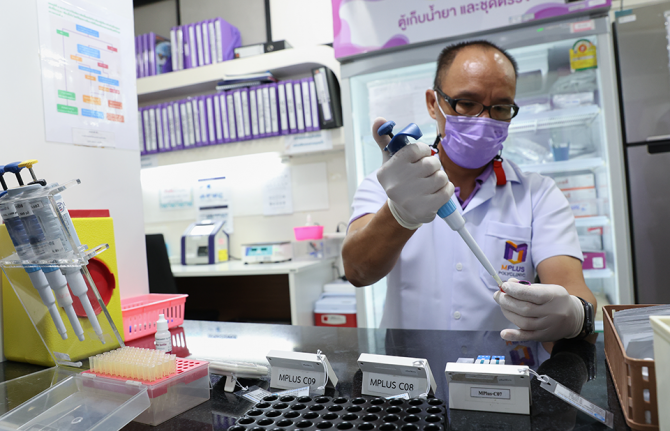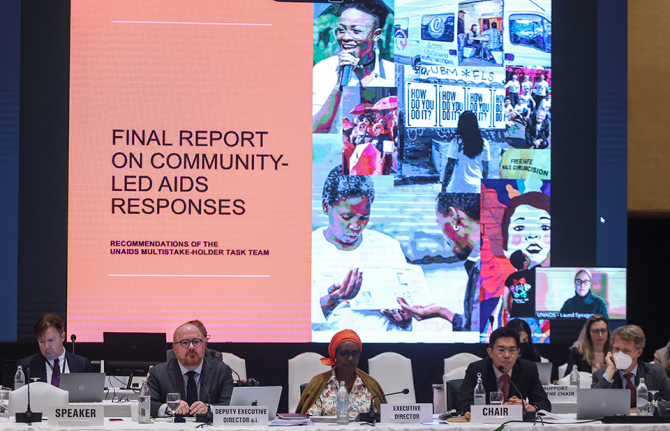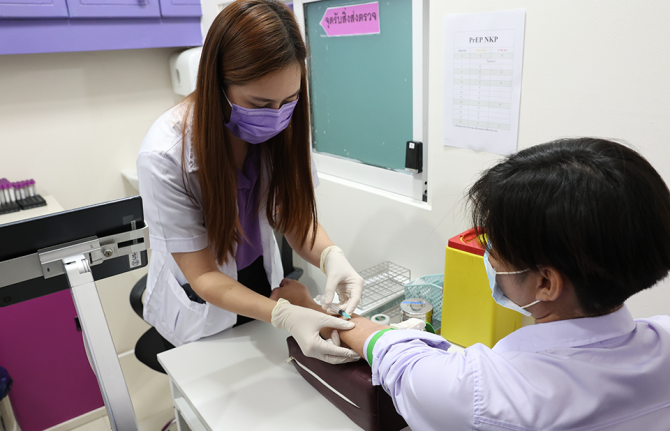



Press Release
Pandemics can only be defeated if communities are supported to lead, say governments, NGOs and UN
15 December 2022 15 December 2022CHIANG MAI, THAILAND, 15 December 2022—Community-led responses are a critical part of the AIDS pandemic response, and must be prioritised in resourcing. The approach, set out by governments, civil society organisations and United Nations agencies at an international meeting on AIDS in Chiang Mai, Thailand, will also be key for tackling other pandemics and for preparing for the pandemics to come, delegates said. The meeting saw the first international definition of a community-led response to a pandemic, published after a two-year consultative process that brought together 11 governments, representing each region of the world, and 11 civil society representatives. This UNAIDS multi-stakeholder task team on community-led responses was co-convened by the World Health Organization and United Nations Development Programme, and presented outcomes to the 51st Programme Coordinating Board meeting of the UN Joint Programme on HIV and AIDS.
Using the new definitions and recommendations, German Federal Health Minister Prof. Karl Lauterbach and the UNAIDS Executive Director Winnie Byanyima published an article in The Lancet today calling for inclusion of comprehensive “community pandemic infrastructure” in pandemic prevention, preparedness and response in new planning, international agreements, and financing. In it, the leaders show that strong community infrastructure, working synergistically with government, is a necessary but neglected element of effective pandemic prevention, preparedness, and response. Using evidence from AIDS, mpox, COVID-19, and Ebola, the authors describe how community-led organisations bring trust, communications channels, and reach to marginalised groups that complement government roles and improve equity.
The new international definitions and recommendations can help planners and funders for AIDS and other pandemics identify the elements of an effective community response. Community-led organizations, defined as "groups and networks, whether formally or informally organized ... for which the majority of governance, leadership, staff, spokespeople, membership and volunteers, reflect and represent the experiences, perspectives, and voices of their constituencies and who have transparent mechanisms of accountability to their constituencies,” form a backbone of that response. Crucially, it is noted that "not all community-based organizations are community-led.”
"While what is most often understood as infrastructure – like labs and hospitals – are important, also essential to effective pandemic response is the community infrastructure which includes people to do outreach, trusted voices who can speak to excluded communities, independent accountability mechanisms, and participation in decision-making,” explained Dr Matthew Kavanagh, UNAIDS Deputy Executive a.i for Policy, Advocacy and Knowledge. “This task team of governments, civil society, and international organizations has given important new tools to support the building and monitoring of community-led capacity. We will only be able to end AIDS and stop other pandemics by ensuring that this community infrastructure is intentionally enabled, strengthened, monitored, and resourced.”
The United Nations Joint Programme on HIV/ AIDS (UNAIDS) Board meeting in Chiang Mai included dialogue between member states and non-state participants on how to develop laws and policies to facilitate community-led response. The recommendations of the multistakeholder task team include developing better systems for financing community-led organisations, which often face legal, capacity, and eligibility barriers to national and international financing mechanisms; monitoring community-led capacity; and integrating data generated by community groups into response management.
To end the AIDS pandemic, board members pointed out, community responses to HIV must be integrated into all levels of countries’ AIDS strategies including planning, budgeting, implementation, monitoring and evaluation.
The principles developed apply not only to AIDS. "Stopping COVID-19, mpox, and Ebola, and preparing for the next pandemic, all require that partnership of government and community together. The newly agreed framework for defining and measuring community-led responses make us better equipped to address the inequalities that are holding back progress in ending AIDS,” said Dr Kavanagh.
In Thailand, as delegates saw for themselves first hand, key-population-led health services have reached people at increased risk of HIV, achieving among the most equitable HIV responses in the region. In South Africa, community leaders with Ritshidze, which represents people living with HIV, visit clinics and communities to assess COVID-19, HIV, and tuberculosis services and hold administrators accountable for addressing issues such as long waiting times or confidentiality gaps that keep some people away from health services. Amid war, Ukraine’s 100% Life, a network of people living with HIV, has used peer networks to communicate with displaced people, delivering medicines, food, and emergency assistance.
"International pandemic agreements and funding should include specific goals for community-led capacity," said Dr Kavanagh. "To be effective, pandemic responses need to move beyond one-way communications to bring communities into decision making at all levels. Community leadership is not mere nice-to-have. It is essential for ending pandemics."
The Lancet article marking the occasion by the German Health Minister and the UNAIDS Executive Director is here.
The report presented at the UNAIDS Programme Coordinating Board meeting is here.
Resources on Community Led Pandemic Response are here.
UNAIDS
The Joint United Nations Programme on HIV/AIDS (UNAIDS) leads and inspires the world to achieve its shared vision of zero new HIV infections, zero discrimination and zero AIDS-related deaths. UNAIDS unites the efforts of 11 UN organizations—UNHCR, UNICEF, WFP, UNDP, UNFPA, UNODC, UN Women, ILO, UNESCO, WHO and the World Bank—and works closely with global and national partners towards ending the AIDS epidemic by 2030 as part of the Sustainable Development Goals. Learn more at unaids.org and connect with us on Facebook, Twitter, Instagram and YouTube.
